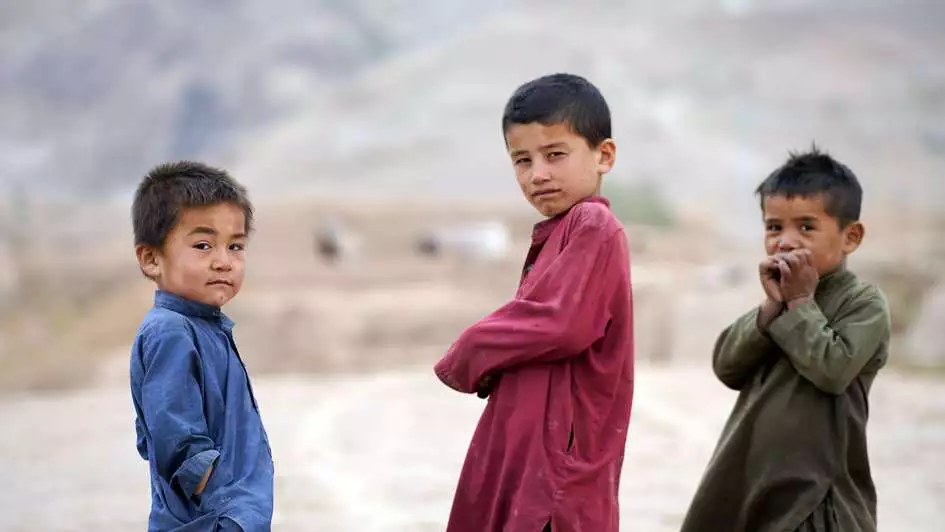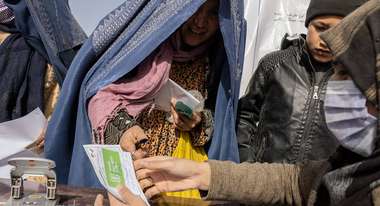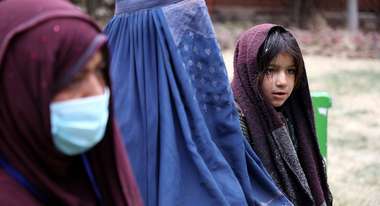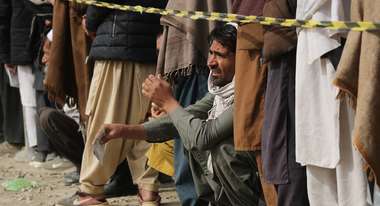Afghanistan: Help for people in need must remain possible
German aid organizations continue to stand by the Afghan people

Berlin 06.05.2021 The withdrawal of international troops has fundamentally changed the military situation in Afghanistan. The need of the population, however, remains great. At present, every third inhabitant of Afghanistan is dependent on humanitarian aid. Therefore, German relief organisations are staying in the country to provide aid on the ground.
Johanniter, CARE, Diakonie Katastrophenhilfe, Help - Hilfe zur Selbsthilfe, Islamic Relief, Welthungerhilfe (WHH) and World Vision have been active in Afghanistan for many years. They have strengthened a growing civil society there to jointly advocate for the needs of the Afghan population. Every day, cooperation creates foundations for many improved services and development opportunities. Internally displaced persons and refugees are supported with humanitarian aid to ensure their survival. Children's and women's rights have been enshrined, respected and lived in recent years. They have allowed many people new freedoms.
The organizations want to continue on this path in the coming years. That is why they promise to stay in Afghanistan as long as their work is needed. Unhindered access to the people in the different regions is indispensable for this, which must be guaranteed under security guarantees from all sides. Humanitarian aid is impartial and neutral, humanitarian aid workers must not become the target of military action, which prevents their basic task: Helping those in need.
11 million people suffer from hunger
Aid agencies are calling for continued financial support from the international community to alleviate the enormous needs in Afghanistan. "Eleven million people in Afghanistan suffer from hunger - more than a third of the population. Among them are almost two million children under the age of five who are at risk of acute malnutrition," says Michael Frischmuth, Continental Director Asia at Diakonie Katastrophenhilfe. "Hunger is on the rise in Afghanistan as people have been suffering from droughts, floods and unemployment for the past three years. Covid-19 and the sharp rise in food prices are making the situation worse for all those families who are already struggling to survive," says Thomas tenBoer, Country Director of WHH in Kabul.
A quarter of the population without access to health care
The Afghan health system has developed steadily over the last 20 years. Johanniter and its local partners have been able to contribute to the improvement of the Afghan health system through first aid courses, the establishment of an ambulance service, and the training of medical staff and midwives. However, 30 percent of the population still have no access to medical care. This is especially true for the 1.8 million internally displaced persons (IDPs) who have fled violence and live under difficult conditions in the slums of the big cities. "Johanniter stands by the Afghan people in this time of transition. We remain committed to providing life-saving medical care to IDPs and other vulnerable populations to alleviate their suffering and preserve their dignity," says Helen Guillermo, Johanniter Country Director in Kabul.
Education and work – creating perspectives in the country
Help - Hilfe zur Selbsthilfe was founded 40 years ago to support Afghan refugees. For many years, the focus has been on education and training programs. In the spirit of assistance towards self-reliance, we promote local capacities and empower Afghans to help themselves and take their future into their own hands. "We focus on empowering the local people because this creates prospects for a self-determined life. Many of the women and men we have trained can now earn their own living. Qualified skilled workers in marketable professions are urgently needed to structurally and sustainably rebuild and develop the country. We still see great potential here, but also a huge need," says Julian Loh, Help program coordinator for Afghanistan.
Children, Youth, Women's Rights
The children of Afghanistan are among the most vulnerable to the harsh socio economic impacts of the looming drought, intensifying conflict and ongoing COVID-19 challenges. Child mortality, malnutrition, forced marriages, sexual abuse, child labour and other forms of violence and exploitation and are all common challenges for the average child. World Vision Afghanistan (WVA) is working with communities to enhance the rights of boys and girls, especially girls at risk of child, early and forced marriage. In 2020 alone, WVA reached over 4,000 boys and girls with life skills classes, to support informed choices and participate in decisions affecting their lives.“ Young women and girls have unique insights and experiences living through all phases of conflict and are crucial in identifying local solutions to achieve sustaining peace and social change. The International community should continue to utlise this power to help protect the rights of the most vulnerable, and to ensure everyone has equal opportunity to participate in effective programs that create lasting and continuous change” says Asuntha Charles, National Director for WV Afghanistan.
WHH is one of the largest private aid organizations in Germany; politically independent and non-denominational. It is fighting for “Zero Hunger by 2030”. Since it was founded in 1962, more than 9,830 overseas projects in 70 countries have been supported with €3.95 billion. WHH works on the principle of empowering people to help themselves: from fast disaster relief to reconstruction and long-term development cooperation projects with national and international partner organizations.







